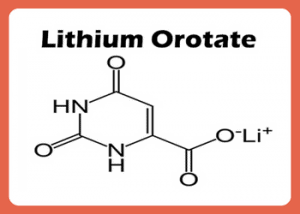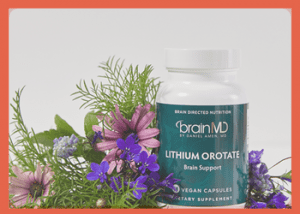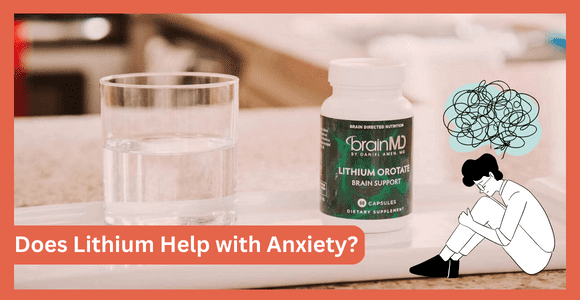Anxiety disorders are among the most common mental health conditions worldwide, affecting millions of people of all ages and backgrounds. While there are several effective treatments available for anxiety, such as cognitive-behavioral therapy and pharmacotherapy with antidepressants and benzodiazepines, these treatments may not work for everyone.
In recent years, lithium supplement has emerged as a potential treatment for anxiety, particularly in individuals who do not respond to other treatments. Lithium has been used for decades to treat bipolar disorder, and recent research suggests that it may also have benefits for anxiety, making it a game-changer for anxiety sufferers everywhere.
Table of Contents
What is It?
The third element on the periodic table, Lithium (Li), is a soft, white metal that uniquely belongs to the alkali family. Its high reactivity makes it useful in creating compounds with other elements – an ability few others share!
 Lithium is found naturally in various minerals, such as spodumene, lepidolite, and petalite; plus it’s present in the ocean and many thermal springs.
Lithium is found naturally in various minerals, such as spodumene, lepidolite, and petalite; plus it’s present in the ocean and many thermal springs.
Although lithium has a low density which makes it flammable to an extent that special attention must be given to how it’s stored – this element plays an essential role in numerous industries and technologies due to its unique properties.
Lithium-ion batteries are indispensable for a variety of items from portable electronic devices like laptops and smartphones to more specific purposes such as ceramics, glass, aluminum production, and electric vehicles.
It is an invaluable element with numerous applications due to its small atomic weight and size. It is a popular choice for batteries because of how easily it moves through materials, as well as the fact that it has been proven to alter brain chemistry effectively when used in medicine.
Specifically, it is widely known for being utilized as a mood stabilizer for bipolar disorder treatment but also can be administered to help alleviate symptoms of depression or other mental health issues.
Although lithium has great worth, it is essential to be cautious when handling and discarding this material and its compounds in order to shield both people and the environment from any potential damage.
What Does Lithium Do to a Normal Person?
For decades, lithium has been prescribed to treat a wide array of mental health conditions such as bipolar disorder, depression, and schizophrenia. Used correctly, it can have an overwhelmingly positive effect by stabilizing moods and preventing erratic episodes that prove detrimental to the quality of life for those living with these issues.
Lithium has been proven to drastically reduce suicide and hospitalization rates in people with bipolar disorder, while simultaneously boosting overall social and occupational functioning. Furthermore, it can also be an effective treatment for depression on its own or alongside other medications.
 Although the precise manner in which lithium works is unknown, it is suspected to influence neurotransmitters such as serotonin, norepinephrine, and dopamine in the brain.
Although the precise manner in which lithium works is unknown, it is suspected to influence neurotransmitters such as serotonin, norepinephrine, and dopamine in the brain.
Additionally, research suggests that lithium may safeguard against neuronal harm while also promoting good neurological health.
Although lithium is highly effective, it can potentially cause a variety of side effects such as increased thirst and urination, hand tremors, weight gain, or alterations in thyroid or kidney function. For this reason, individuals taking lithium should be carefully monitored for any signs of these adverse reactions.
Consequently, regular blood tests should be conducted in order to make sure lithium levels remain within the effective range and that no organ damage occurs.
Ultimately, lithium is an efficacious medication for managing a variety of mental health issues and has been safely applied for numerous years with positive results.
Nevertheless, it is essential to take into account the possible risks and side effects before taking any medication. Working with a healthcare provider can guarantee your safety while ensuring that you get the most out of your treatment.
Is Lithium an Anti-Anxiety Drug?
Although Lithium is commonly used for treating bipolar disorder, depression, and other mental health issues, it does not fall within the category of a traditional anti-anxiety drug. In fact, it is rarely prescribed to treat anxiety disorders such as generalized anxiety disorder or panic disorder.
In certain situations, lithium can be used as an additional treatment for anxiety symptoms in individuals suffering from both bipolar disorder and other mental health conditions. Utilizing lithium to combat anxiety should only be done with the guidance of a healthcare professional after careful consideration on a case-by-case basis.
Does Lithium Help with Panic Attacks?
Lithium is rarely used as the initial course of action for panic attacks. Instead, antidepressants like selective serotonin reuptake inhibitors (SSRIs), benzodiazepines, or cognitive-behavioral therapy (CBT) are preferred treatments for this condition.
In some cases however, lithium can be beneficial to those suffering from mental health issues such as bipolar disorder and therefore may be considered on an individual basis in consultation with a healthcare provider.
Frequently Asked Questions
How Much Lithium Should I Take for Anxiety?
Lithium is typically taken 1-3 times daily with or without food. Patients usually start at a low dose of the medication and progressively increase over multiple weeks, ranging from 600 to 1200 mg per day. Some patients may even need higher doses contingent on their weight or symptoms.
Is Lithium Good for Depression and Anxiety?
Moreover, lithium is utilized as a single treatment to manage acute periods of unipolar depression and for maintenance purposes in order to avoid repeat instances of depressive episodes.
Does Lithium Calm the Brain?
Neurotransmitter Regulation: Lithium has been proven to amplify the effects of GABA, a calming neurotransmitter while reducing dopamine and NMDA levels that can lead to increased stimulation.
How Well Does Lithium Treat Depression?
In most cases, if you suffer from depression your doctor will prescribe an antidepressant medication first because it is typically a more effective treatment than lithium.
Nonetheless, if the antidepressants have not done their job and helped alleviate your symptoms, then your physician might suggest giving lithium a try as well. This could be a successful alternative that helps improve your condition significantly.
Can I Take Lithium for a Long Time?
Generally, lithium is safe to take for an extended period of time – many people have taken it without issue for years. However, if you’ve been taking lithium for a while, it can lead to weight gain as well as possible issues with your kidneys or thyroid gland.
What Happens If You Take Lithium and Not Bipolar?
Lithium is a well-known medication primarily used for the treatment of bipolar disorder. It helps to stabilize mood swings and reduce the intensity of manic and depressive episodes. However, the effects and potential risks of taking lithium if you are not diagnosed with bipolar disorder can be significant. Understanding these implications is crucial for anyone considering or inadvertently taking lithium without a medical indication.
Pharmacological Effects of Lithium
Lithium affects various neurotransmitter systems in the brain, including the modulation of serotonin and norepinephrine. It also influences ion transport in nerve and muscle cells, which contributes to its mood-stabilizing effects. These actions can have a broad impact on brain function and mood regulation, which may not be beneficial for individuals without bipolar disorder.
Potential Outcomes and Side Effects
Mood Alterations:
Euthymic Individuals: For someone with a normal mood range (euthymic), taking lithium might not lead to the desired mood stabilization. Instead, it can cause subtle to significant alterations in mood and emotional state, potentially leading to feelings of dullness or emotional blunting.
Induced Symptoms: In some cases, lithium can induce symptoms such as mild depression, lethargy, or cognitive dulling. These symptoms arise because the medication may disrupt the natural balance of neurotransmitters in the brain
Cognitive and Physical Side Effects
Cognitive Impairment:
Memory and Concentration: Lithium can affect cognitive functions, leading to issues with memory, attention, and concentration. These cognitive side effects can impair daily functioning, particularly in tasks requiring high mental acuity.
Thyroid Function:
Hypothyroidism: Lithium use is associated with an increased risk of hypothyroidism. This condition occurs when the thyroid gland does not produce enough hormones, leading to symptoms such as fatigue, weight gain, and depression. Monitoring thyroid function is crucial for those on lithium, even those without bipolar disorder.
Kidney Function:
Renal Impairment: Long-term lithium use can lead to nephrotoxicity, resulting in impaired kidney function. This can be particularly concerning for individuals without a clear medical need for lithium, as the risk-benefit ratio is not favorable.
Electrolyte Imbalance:
Sodium Levels: Lithium can affect sodium and water balance in the body, potentially leading to dehydration and electrolyte imbalances. These imbalances can cause a range of symptoms from mild (e.g., increased thirst) to severe (e.g., confusion, seizures).
Behavioral and Psychological Effects
Emotional Blunting:
Reduced Emotional Range: Lithium can blunt emotional responses, leading to a diminished range of emotions. For someone not experiencing the extreme mood swings of bipolar disorder, this can result in an overall sense of emotional numbness or lack of joy.
Risk of Misdiagnosis:
Erroneous Treatment: Taking lithium without a bipolar diagnosis can complicate the accurate diagnosis of other potential mental health conditions. It may mask symptoms or create new ones, leading to misdiagnosis and inappropriate treatment plans.
Lithium is a potent medication with specific indications primarily for bipolar disorder. When taken without a medical need, it can cause a range of adverse effects, from cognitive impairments and emotional blunting to serious physiological issues like hypothyroidism and renal impairment. The risks associated with off-label use or misuse of lithium highlight the importance of using it strictly under medical supervision and for appropriate clinical indications. If you suspect you might benefit from lithium or any other psychotropic medication, it is essential to consult with a healthcare provider to ensure safe and effective treatment tailored to your specific health needs.
Conclusion
Overall, lithium is a time-tested medication oftentimes employed to manage mental health afflictions such as depression and bipolar disorder. It may not be the first course of action for anxiousness; however, recent studies propose that it could benefit those who don’t respond well to other forms of therapies.
Nevertheless, it is critical to take into account the possible consequences and potential side effects of any medication before utilizing it. It’s also essential to work with a healthcare practitioner in order to make sure that you are receiving efficient and secure treatment. Some individuals have reported success when using Lithium for anxiety; while others may not find as much relief or could even experience worsened symptoms.
Low-dose lithium is a promising topic of research for the potential treatment of anxiety, yet further studies are necessary to grasp its full prospects. Although it can be effective in treating depression and anxiety for certain individuals, this medication should only be taken with the oversight of a specialized healthcare provider.
